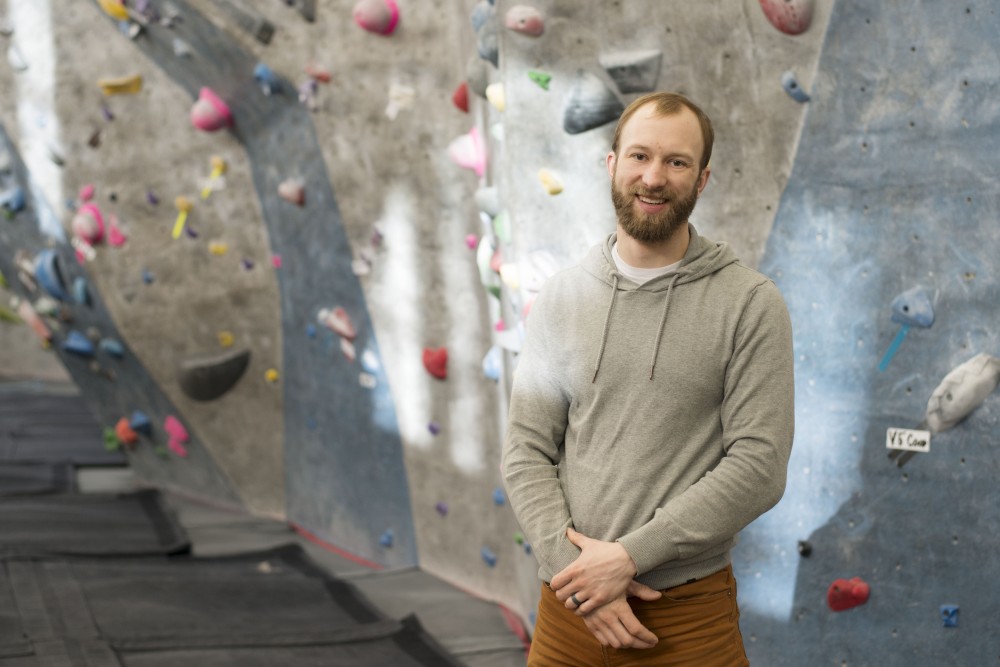Five days into a Peruvian expedition, he had no map, no human contact and no worries.
Bryan Karban, manager at the University of Minnesota’s Center for Outdoor Adventure, made it home safely and continued to do what he does best: inspire.
Beginning his journey with the COA as a student at the University in 2010, Karban has been a full-time employee since the opening of the University’s climbing wall in 2013. Having graduated with a degree in history and political science, Karban’s time with the COA inspired a different path.
“I like to do any type of human-powered recreation,” Karban said. “If I have to use my body to move myself — whether it be over land, water, up a mountain — I just like the feeling of doing those activities myself.”
With a love for all disciplines of climbing, Karban has been an integral figure in the development of the University’s outdoors program. Originally named the “Skiwaxers Club” in the 1980s, the program has turned into an entire University department.
Its main mission, Karban said, is to get people out there.
“Our approach is really to take anyone … and have them get connected to an experience and have them learn from the opportunity. We see the outdoors as a development of leadership, risk management and residency for all,” Karban said. “Outdoor recreation is just the vehicle we use to get to these larger ideas.”
Whether he’s working with a Recreation and Wellness Center visitor or student employee, the mentor’s mission hits the mark.
“He is very approachable and considerate of anything that might be stressing us out,” said Spencer Krueger, one of Karban’s student employees and an information systems junior at the University. “He goes out of his way to include us on COA trips that have open spots and plans events for all of us.”
Karban’s student stewardship preps the new generation of outdoor leaders and inspires them for the trails ahead. In fact, this is the most definable feature of Krueger’s boss, he said.
“Brian genuinely wants to make sure everyone can succeed, and is more than willing to help them both personally and professionally do so,” Kruger said.
Having lived in Colorado after school, rock-climbed in 10 states and four other countries, and challenged himself with solo treks, Karban takes skills he’s learned and hands them off to his students. As an instructor for three University courses, the grind doesn’t stop.
“My favorite part of being in a class with [Karban] is how well he can dumb down concepts and then reinforce ideas by demonstrating them himself and then allowing us to practice them,” said senior electrical engineering student Dillon Wong. “He is a funny and lighthearted guy, so it makes it easy to learn from him and ask questions at any point.”
From the chalk-laden walls of the RecWell Center to a Peruvian expedition that left him exploring with very limited human contact, Karban makes sure to find time to himself – he encourages everyone to try it out.
“I try to do one solo trip a year. I joke that if I can’t stand spending some time alone I should then probably check in on my life because others probably can’t stand me either,” Karban said. “There’s a lot of value in solo travel.”
Though not a solo adventure, Karban’s dream climb happened in British Columbia’s Bugaboo Provincial Park, where he spliced hobby and profession into one epic ‘send.
“The Beckey-Chouinard route is one I had wanted to do it since college, I had seen it as my dream climb. The environment is so beautiful and the terrain is big,” Karban said.
The route typically takes climbers two to three days. It consists of over 9 miles of hiking and 3,000 feet of scrambling and mixed climbing.
Karban and his climbing partner did it in one continuous 16-hour push.
“I hate carrying heavy gear, so if we can safely do something in a day I usually try to do it. It was a really soulful climb,” Karban said.
The leader’s tenacity doesn’t stay on the mountain. Karban aims to spark a new era in the outdoor industry — a space that’s grappled with diversity.
“I think as outdoor rec tries to be more inclusive, we need to be open to more ways of experiencing activities and experiencing the natural world,” Karban said. “We need to be in discussions about this.”
From leisurely sea kayaking to teaching a climbing course at the University, Karban not only encourages students to get outside and try something new, but to think harder about why they’re doing it.
The outdoors don’t demand the newest gear or the need to run the roughest trail. They encourage struggle and require pliability, it’s that simple.
“In a Mexico national park once, repelling off this climb, there was a truck blaring Mexican mariachi music and a family having a barbecue way down below,” Karban said. “We were both experiencing the outdoors in a way that was meaningful. There’s no right way to experience the outdoors.”








